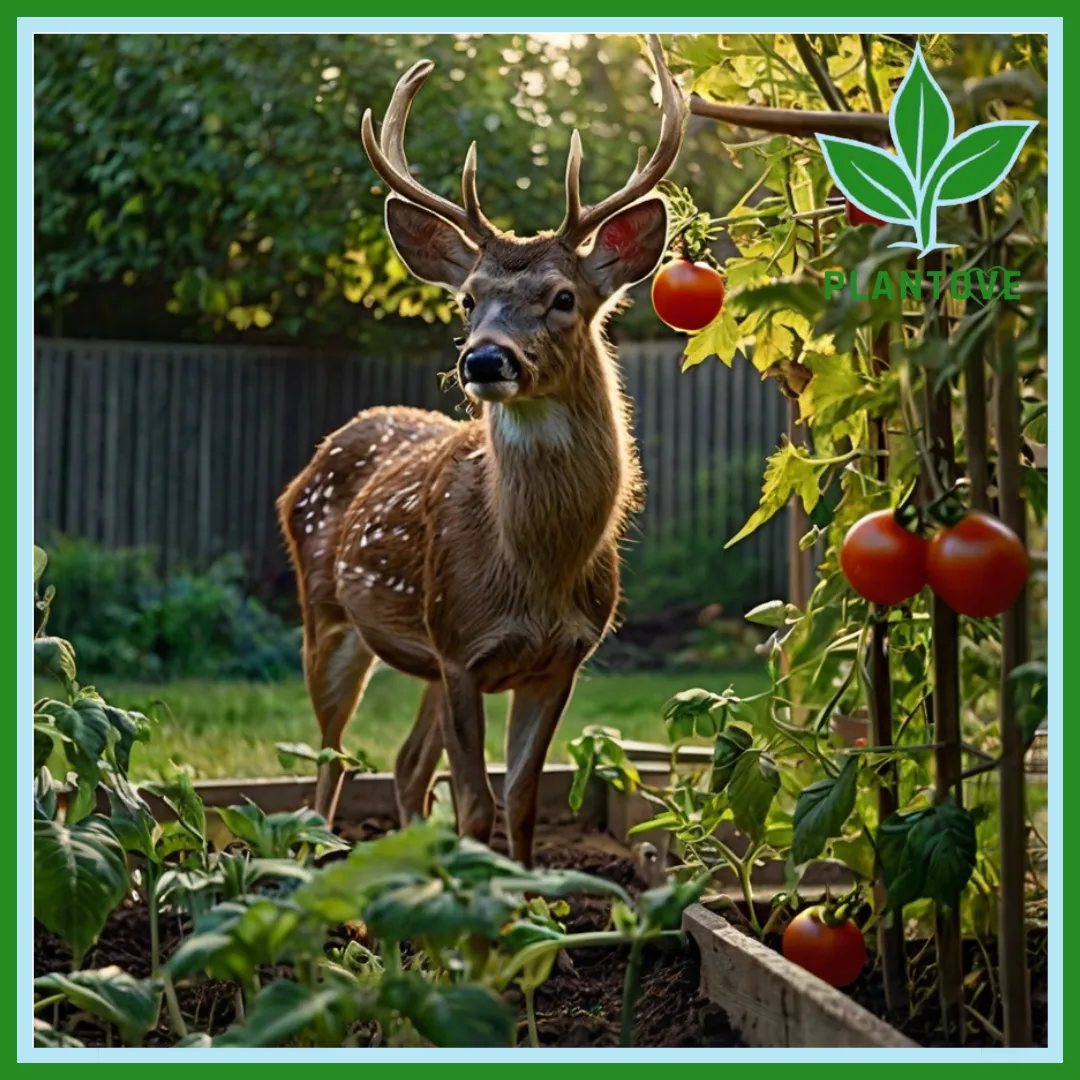Yes, deer do eat tomato plants. While tomatoes aren’t necessarily a primary food source for deer, they can become a target, especially when food is scarce. Deer are known to browse a variety of plants and will eat both the leaves and fruit of tomato plants if they come across them.
Deer are opportunistic feeders, which means they’ll eat many types of plants depending on what’s available. While tomato plants may not be their first choice, they can certainly nibble on them, especially when other food sources are limited.
Why Do Deer Eat Tomato Plants?
Tomato plants may not be deer’s favorite meal, but during certain seasons, especially in late summer and early fall when other vegetation has become less available, deer might turn to tomato plants as an easy source of nutrients. Deer are known to consume plants that are rich in water, and since tomatoes have high water content, it makes sense that they might be attracted to them.
Furthermore, deer enjoy tender, new growth, and the soft leaves of tomato plants can be especially appealing to them. If a deer stumbles upon your garden, it might sample your tomato plants out of curiosity or necessity.
How to Tell If Deer Have Eaten Your Tomato Plants
One of the most common signs of deer damage is the distinctive way they eat plants. Unlike smaller animals, deer lack upper front teeth, so they tend to tear plants rather than cleanly cut them. If your tomato plants look ragged, with uneven tears or missing leaves, it’s likely that deer have been browsing in your garden.
Other signs include:
- Hoof prints: Deer tracks are fairly easy to identify. Their hoof prints are typically about two to three inches long and shaped like a heart or upside-down V.
- Droppings: If you find small, pellet-like droppings near your tomato plants, it could be a sign of deer activity.
- Damaged fruits: Deer tend to bite into the fruits of tomato plants, leaving partially eaten tomatoes hanging from the vines or scattered on the ground.
How to Protect Tomato Plants from Deer
Now that you know the answer to “Do deer eat tomato plants?” it’s time to explore how to prevent them from snacking on your garden. There are several methods you can use to protect your tomato plants from deer.
1. Fencing
The most effective way to keep deer out of your garden is by using a fence. Deer can jump up to eight feet high, so your fence needs to be at least that tall to keep them out. You can use a variety of fencing materials, such as metal, wood, or plastic mesh. Make sure the fence is sturdy and secure around the perimeter of your garden.
Another option is to install an electric fence. Electric fences deliver a mild shock when touched, which can deter deer from entering your garden. While this method is effective, it may not be suitable for all homeowners, especially those with pets or children.
2. Use Deer Repellents
There are numerous deer repellents available that can help deter deer from your tomato plants. These products are usually sprayed directly onto the plants or around the garden perimeter. Most deer repellents work by emitting a strong odor or taste that deer find unappealing.
Common types of deer repellents include:
- Scent-based repellents: These often use ingredients like garlic, rotten eggs, or predator urine to create a smell that deer dislike.
- Taste-based repellents: These products make plants taste bitter or unpleasant, discouraging deer from eating them.
Natural repellents such as hanging bars of soap or placing human hair around the garden can also be effective, though their success rate may vary depending on local deer behavior.
3. Plant Deer-Resistant Plants
Deer tend to avoid certain plants, so incorporating these into your garden can help protect your tomato plants. Some examples of deer-resistant plants include:
- Lavender
- Marigolds
- Thyme
- Rosemary
By planting these around your tomato plants, you can create a natural barrier that deer are less likely to cross.
4. Install Motion-Activated Sprinklers
Deer are skittish animals, and sudden movements or noises can scare them away. Motion-activated sprinklers can be an effective way to keep deer out of your garden. These devices spray water whenever they detect motion, startling the deer and encouraging them to leave.
Motion-activated sprinklers are especially useful because they don’t harm the animals but effectively deter them from returning.
5. Use Netting or Row Covers
Another way to protect your tomato plants is by using garden netting or row covers. These physical barriers prevent deer from accessing your plants while still allowing sunlight and rain to reach them. Row covers are particularly useful during the early stages of plant growth when young plants are most vulnerable to deer.
While netting may not be aesthetically pleasing, it can be a practical solution, especially if you have a small garden or don’t want to invest in a large fence.
Alternative Methods to Deter Deer
If traditional methods aren’t practical for your situation, there are a few alternative options you might consider.
1. Hanging Reflective Objects
Deer are often startled by reflective objects. Hanging items like old CDs, aluminum foil strips, or reflective tape around your garden can help scare deer away. These objects catch the light and move with the wind, creating a visual deterrent for deer.
2. Create Noise Barriers
Wind chimes, bells, or other noise-making objects can deter deer by creating unfamiliar sounds in your garden. Deer tend to avoid areas with unpredictable noises, as it can make them feel unsafe.
3. Companion Planting
Companion planting is the practice of growing certain plants together for mutual benefit. Some plants, like herbs or flowers with strong fragrances, can deter deer when planted alongside more vulnerable crops like tomatoes. Consider planting garlic, onions, or chives around your tomato plants to keep deer at bay.
Deer-Resistant Gardening in High-Risk Areas
If you live in an area with a high deer population, it’s essential to take proactive steps to safeguard your garden. Planting deer-resistant crops, using physical barriers, and employing repellents can help minimize deer damage.
Best Practices for Deer-Resistant Gardens
- Choose deer-resistant plants: Whenever possible, opt for plants that deer are less likely to eat.
- Rotate repellents: Deer can become accustomed to certain repellents over time, so rotating different types can help keep them effective.
- Keep the garden clean: Removing fallen fruits and pruning plants can reduce deer attraction.
- Train deer away: Deer can be “trained” to avoid certain areas if you consistently use deterrents.
Conclusion: Do Deer Eat Tomato Plants?
In summary, deer do eat tomato plants when food is scarce or when they come across them in their environment. To protect your garden, consider implementing strategies such as fencing, repellents, and deer-resistant plants. With the right preventive measures, you can enjoy a thriving tomato garden without the threat of deer interference.
By staying proactive and vigilant, you can ensure that your tomato plants and other crops remain safe from hungry deer all season long.

